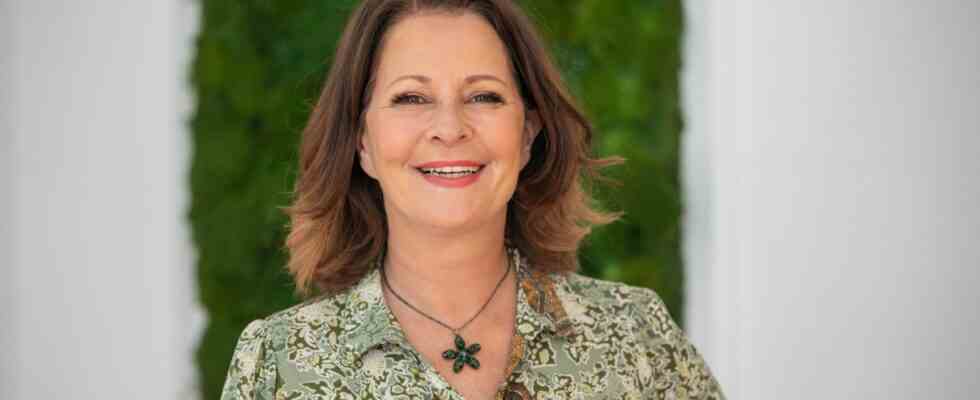New book
Are we all ticking the same way? Germany’s favorite psychologist Stefanie Stahl on the “blueprint of the psyche”
Stefanie Stahl is a successful psychologist worldwide.
© Harald Tittel/ / Picture Alliance
Everyone can join Stefanie Stahl on the couch. She is probably Germany’s best-known psychologist, her books are bestsellers. In her latest work she has dealt with the “blueprint of the psyche”.
She is probably Germany’s best-known psychologist: Stefanie Stahl. The psychologist provides answers to questions about relationships, self-doubt and fears via podcasts, YouTube and blogs – and shows possible solutions to specific problems. Above all, the best-selling author reaches millions of readers with her books. Her intention: to explain psychological connections in such a way that people learn to understand themselves and get along better in life. “This is do-it-yourself therapy for everyone with normal disorders,” she says in the rooms of her practice for psychotherapy in Trier.
After the super bestseller “The child in you must find home” (2015) and other books, the native of Hamburg is now upping the ante. “I am a passionate psychologist. And what has always driven me is the big question: What makes people tick? What is the blueprint of the psyche?” She worked on the question for two years – now her new book “Who we are” will be published on October 13 (Kailash Verlag).
Does the Unity Psyche exist?
“It’s really something new, too,” says the author. “Because I’m going to explain how we are psychologically constructed. Worldwide.” Of course there is individuality, but “the psychological program behind the user interface” – that is ultimately the same for everyone – and not that complicated. Ultimately, everything, even in 99 percent of all conflicts, revolves around “our four basic psychological needs”: the desire for attachment and belonging, the desire for autonomy and control, the desire for self-esteem and the desire to have the best possible feelings and to get rid of bad ones avoid. “Ultimately, almost every psychological problem is also a relationship problem and can be analyzed against the background of our four basic psychological needs,” she says.
How does she explain her success? “I think it’s because my books are very helpful. And that’s actually the only secret,” says the 58-year-old. When she published her book “Jein” about fear of commitment, many of those affected reported. “It was a total revelation for them. They then said: That’s exactly how it is. Now I know what’s going on in my relationship.” The book about the “inner child” also helped many.
Stefanie Stahl’s books are successful worldwide
As a psychotherapist, he finds Stahl’s books “helpful and recommendable,” says Benedikt Waldherr, who is also chairman of the Federal Association of Contract Psychotherapists. “I like working with these books in my practice and I even give them to patients.” Stahl has worked up findings in popular science very well.
On the other hand, as chairman of the association, he is generally rather critical of psychotherapy via the Internet – whether as podcasts, apps, YouTube or via other channels. “I would say that psychotherapy must take place in personal contact,” said Waldherr. This is the only way to be sure that what is said will not be misunderstood and will not cause any damage.
Stahl’s non-fiction books have meanwhile been translated into more than 30 languages. “I never would have expected that before.” Publishers in China, Korea and Poland bought the rights for her new book before it was even published. “I really go wild in Poland. It’s the most successful foreign country for my books.”
More people go to psychologists
She stopped using psychotherapy in her practice earlier this year. “It takes up too much time for me,” she says. “But I still have psychotherapy sessions, for example about the Steel But Hearty podcast.” She worked as a psychotherapist for 30 years – in Trier, where she ended up studying in the mid-1980s. “First I didn’t want to come here at all. Then I got fully involved and meanwhile I’m something of a adopted home. I love the Moselle, the Hunsrück and the Eifel.”
Stahl started writing about 20 years ago. “The first book in 2005 came about on a whim,” she says. The reason was the argument with her ex. “I thought at the time it’s because he’s very introverted and I’m very extroverted.” She dealt with character types and also with who suits who. The search for the right person also took a little longer for her personally: ten years ago, however, it clicked.
Stahl thinks it’s good that people talk about the psyche and problems more than they used to. “The number of mental illnesses has not increased.” People just dared to see a psychologist. “It used to be taboo.” In general, the awareness of the problem has also increased. “There’s a much greater openness to talking about it, to reflecting on yourself.” Many of the people she speaks to have “no mental disorder that is considered to be an illness”, but a normal everyday problem that “stresses them terribly”.
Today, however, there is less external support in society. Less security, but more pressure and: “We always have to make decisions”. That’s just too much stress for some. “And if there is a lack of inner stability, then anxiety and depression can result.”
Stahl: “I’m the opposite of a workaholic”
Steel has no problem with stress. “I’m very leisure-oriented and the opposite of a workaholic,” she says. She always sleeps well and goes hiking a lot, especially in the Eifel, where she has a house in the woods. She prefers to take a white shepherd dog from the neighborhood with her on tours, which she has grown very fond of. Actually, she never wanted an emotional bond with a dog. “Now I miss Ripley all the time when she’s not with me.”
Even though Stahl is very familiar with her psyche and the solutions to problems, she can’t do it without her own burdens either. “I have problems with aging and death. I find that totally stupid, I can reflect on it as I want. I would prefer to freeze myself, so that I don’t get older anymore, that I stay the way I am.” But of course she knows: “The only answer to the problem is that you have to learn to accept it”.




